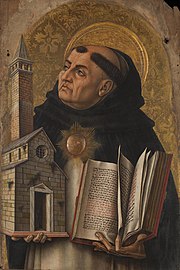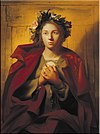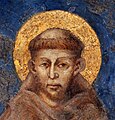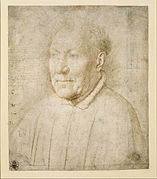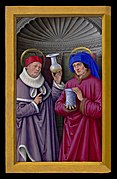Portal:Saints
|
THE SAINTS PORTAL
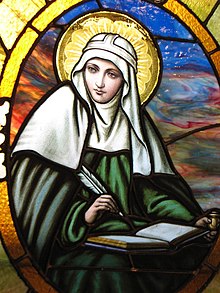 In Christian belief, a saint is a person who is recognized as having an exceptional degree of holiness, likeness, or closeness to God. However, the use of the term saint depends on the context and denomination. In Catholic, Eastern Orthodox, Anglican, Oriental Orthodox, and Lutheran doctrine, all of their faithful deceased in Heaven are considered to be saints, but some are considered worthy of greater honor or emulation. Official ecclesiastical recognition, and consequently a public cult of veneration, is conferred on some denominational saints through the process of canonization in the Catholic Church or glorification in the Eastern Orthodox Church after their approval. While the English word saint originated in Christianity, historians of religion tend to use the appellation "in a more general way to refer to the state of special holiness that many religions attribute to certain people", referring to the Jewish ḥasīd or tzadik, the Islamic walī, the Hindu rishi or Sikh Bhagat and guru, the Shintoist kami, the Taoist shengren, and the Buddhist arhat or bodhisattva also as saints. Depending on the religion, saints are recognized either by official ecclesiastical declaration, as in the Catholic faith, or by popular acclamation (see folk saint). (Full article...) Selected biography
Saint Thomas Aquinas, O.P. (also Thomas of Aquin or Aquino; born ca. 1225; died 7 March 1274) was a priest of the Roman Catholic Church in the Dominican Order from Italy, and an immensely influential philosopher and theologian in the tradition of scholasticism, known as Doctor Angelicus and Doctor Communis. He is frequently referred to as Thomas because "Aquinas" refers to his residence rather than his surname. He was the foremost classical proponent of natural theology, and the father of the Thomistic school of philosophy and theology. His influence on Western thought is considerable, and much of modern philosophy was conceived as a reaction against, or as an agreement with, his ideas, particularly in the areas of ethics, natural law and political theory.
Aquinas is held in the Roman Catholic Church to be the model teacher for those studying for the priesthood. The works for which he is best-known are the Summa Theologica and the Summa Contra Gentiles. One of the 33 Doctors of the Church, he is considered by many Christians to be the Roman Catholic Church's greatest theologian and philosopher. Consequently, many institutions of learning have been named after him. The Eastern Orthodox Church has had a complex relationship with Aquinas' work. In the twentieth century, there was a reaction against this "Latin captivity" of the Orthodox theology, and later writers have emphasized the otherness of scholasticism. Did you know...
Selected saint days
General imagesThe following are images from various saint-related articles on Wikipedia.
CategoriesRelated portalsWikiProjects The Saints Wikiproject aims primarily at standardizing the articles about people venerated by some Christians as saints or the blessed and ensuring quality articles. If there is an interest in including saints from religions other than Christianity, please propose those changes on our talk page. Related topicsSaints: Saint Michael - Saint Gabriel - Virgin Mary - Saint Joseph - Saint John the Baptist - Saint Stephen - Saint Peter - Saint Paul - Saint Augustine of Hippo  Traditions: Calendar of saints - Hagiography - List of saints - Symbology of the Saints Theology: Communion of Saints - Intercession of saints - Martyrs - Patron saint Roman Catholicism: Congregation for the Causes of Saints - Servant of God - Venerable - Beatification - Canonization Muslim Sufi saints: 'Abd al-Qadir al-Jilani - Ahmad al-Rifa'i - Ibrahim al-Disuqi - Ahmad al-Badawi - Al-Shadhili - Baha' al-Din Naqshband - Ibn 'Arabi - Wali Sanga Recognized content
Featured articlesGood articles
Featured pictures
Former featured pictures
Things to doAssociated WikimediaThe following Wikimedia Foundation sister projects provide more on this subject:
Discover Wikipedia using portals |

